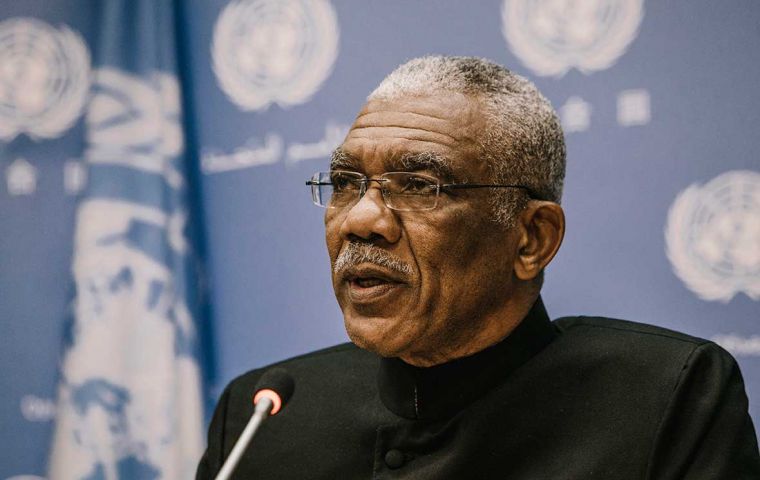MercoPress. South Atlantic News Agency
Venezuela rejects having Guyana's Essequibo dispute taken to the International Court of Justice
 “We concluded that a meaningful progress in the controversy has not been reached and that's why the ICJ was chosen as the means to be used for the resolution”
“We concluded that a meaningful progress in the controversy has not been reached and that's why the ICJ was chosen as the means to be used for the resolution” Venezuela is seeking a “practical and satisfying” solution to its border dispute with Guyana even as the Caribbean Community (CARICOM) country has already filed its application to the International Court of Justice (ICJ) in the Hague on the matter.
“Under the aegis of the Geneva Agreement of 1966, the Government of the Bolivarian Republic of Venezuela proposed the Government of the Co-operative Republic of Guyana to re-establish the diplomatic contacts that allow for a practical and satisfying solution of the territorial controversy,” the Ministry of Foreign Affairs said in a statement.
Caracas said that it “objects to the judicial settlement as a means of resolving the territorial dispute over Guyana's Essequibo, since it violates the preamble of the 1966 Geneva Agreement, which establishes, exhaustively, that the controversy must be “amicably resolved in a way that is acceptable to both parties”.
It said that the move to the ICJ also violates Article I, since it does not lead to “satisfactory solutions for the practical settlement of the dispute”.
The Geneva Agreement of 1966 was signed between Venezuela and the United Kingdom regarding steps for a future resolution of the border controversy. Venezuela had rejected the Arbitral Award of 1899 between both countries as “null and void,” claiming sovereignty over a portion of what was then British Guiana.
The Ministry of Foreign Affairs said that Guyana's move to have the judicial settlement “is unacceptable, sterile and unenforceable, given that the Bolivarian Republic of Venezuela does not recognize the jurisdiction of the International Court of Justice as mandatory, and in this sense, it has always been consistent with its historical position of making an express reservation or not being a signatory of any international legal instrument that contains arbitration clauses that grant compulsory jurisdiction to the aforementioned Court.”
In January, the United Nations Secretary-General Antonio Gutierrez decided to hand the border dispute between the two countries to the ICJ, a move that was rejected by Caracas but welcomed by Georgetown.
“We concluded that a meaningful progress in the controversy has not been reached and that's why the ICJ was chosen as the means to be used for the resolution,” Guterres said then.
The border dispute between the two countries have become even more important after the US-based oil giant, ExxonMobil reported the discovery of a significant amount of oil in the disputed area in 2015.
When it filed its position with the ICJ earlier this week, Guyana said it was requesting the court to confirm the legal validity and binding effect of the 1899 Arbitral Award regarding the boundary between the two countries.
In its application to the court, Guyana highlighted that Venezuela had, for more than 60 years, consistently recognized and respected the validity and binding force of the 1899 Award and the 1905 Map agreed by both sides in furtherance of the award.
“Venezuela had only changed its position formally in 1962 as the United Kingdom was making final preparations for the independence of British Guiana and had threatened not to recognize the new State, or its boundaries, unless the United Kingdom agreed to set aside the 1899 Award and cede to Venezuela all of the territory west of the Essequibo River, amounting to some two-thirds of Guyana's territory,” the statement from the Ministry of Foreign Affairs in Georgetown note.




Top Comments
Disclaimer & comment rules-

-

Read all commentsCaracas' idea of ”“amicably resolved in a way that is acceptable to both parties” can be translated into VZ gets to stay with the Essequibo region....and not surprising this nationalistic sentiment should surface after Exxon discoved oil reserves in the region... and neither is it surprising they don't want the dispute to be ruled upon in the ICJ.
Apr 02nd, 2018 - 02:40 pm 0Sounds exactly like the Argy claim to the Falkland Islands.
Expansionism is rampant in at least three South American countries, Argentina, Venezuela and Bolivia all want chunks of or all of what others have.
Apr 03rd, 2018 - 02:15 am 0Commenting for this story is now closed.
If you have a Facebook account, become a fan and comment on our Facebook Page!